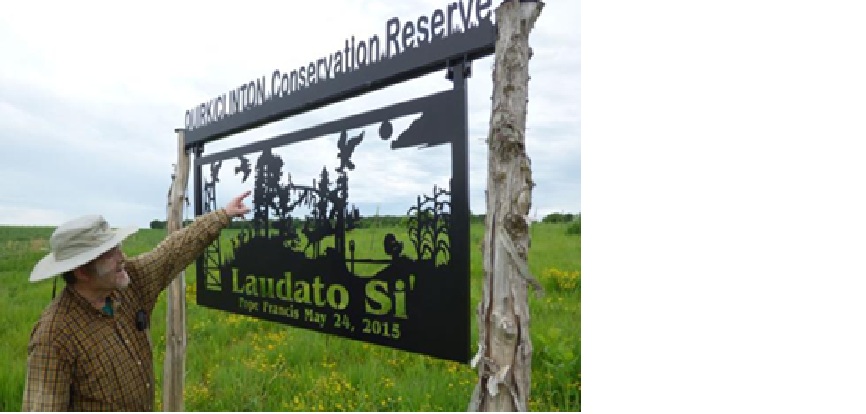By Fr. Kevin Clinton
Fr. Kevin is a priest member of the Laudato Si’ Movement Minnesota Chapter and is supportive of our lay-led structure. He is active with the Events Working Group and has been with our Care for Creation efforts for a little over 4 years. He also owns a conservation reserve dedicated to Laudato Si’ which was his family’s farmland.
As Catholics we recognize “source & summit” of the Church’s life as the Celebration of the Eucharist. The Roman Missal, which we use for Eucharistic celebration, has added prayers to be used in a new votive Mass, “For the Care of Creation.” This is a first step placing the teaching of Laudato Si’ officially within the Church’s liturgical life.
Why this moment matters
On July 3, 2025, the Vatican made a historic announcement: the introduction of a new Mass “For the Care of Creation” (Missa pro custodia creationis) into the Roman Missal. This marks the first time the Church formally includes a liturgical prayer focused on creation as part of its public worship. But this moment is about more than a new set of prayers. It represents a bold spiritual milestone—a clear sign that caring for our common home is not merely an environmental issue, but a deeply moral and faith-centered calling.
Why is this important?
What we pray shapes what we believe—and how we live.
For too long, ecological concerns have been seen as something external to the life of faith. But the climate crisis, the collapse of ecosystems, and the suffering of the poor are not just social or environmental issues. They are deeply spiritual crises that call us to conversion. This new Mass is the Church’s response, an expression of the call to ecological conversion offering the faithful the language and sacred space to bring the cry of the Earth and the cry of the poor to the altar.
And when this Mass is celebrated within creation itself, it becomes a powerful act of communion. It allows us to pray with creation, not just for it—to be immersed in the living world and, as Laudato Si’ teaches,
“…see nature as a magnificent book in which God speaks to us and grants us a glimpse of His infinite beauty and goodness” (LS 12).
In these sacred outdoor celebrations—under the sky, among trees, surrounded by the sounds of life—we remember that the Earth is not only a gift to be protected, but a sanctuary where God dwells and speaks.
This Mass matters because it calls us to worship with open eyes, open hearts, and open hands—rooted in the soil of creation and reaching toward heaven in hope.
The votive Mass prayers are a first step taken by the central teaching of the church, but many more steps forward can be hoped for. Since May 24, 2015 promulgation of Laudato Si’, there has been much development in the Church’s grassroot organization which created theology and communal prayers flowing from the care of creation teaching. These developments have accompanied a rapidly growing global awareness that there is a global crisis, and the deepening ecological crisis is triggering desperation among peoples and nations. The “Care of Our Common Home” encyclical is clearly a CATHOLIC (universal) issue.
Considering the growing concern, commentators have welcomed the new votive Mass prayers “For the Care of Creation,” but express the hope that the global need will cause dramatic liturgical steps to be taken. Below are some comments from individuals who are leaders within the unfolding teaching of Laudato Si’.
Dr. Dan Horan, a theologian who has written for decades on Franciscan theology and the theology of creation and eco-spirituality, made the following observations on July 10, 2025:
- The Eucharist is, without a doubt, the “sacrament of unity.” It famously unites each member of Christ’s body to Christ himself as well as to each person in the assembly. Furthermore, we are united with the “fruits of the earth” that became for us the true sacramental presence of Christ. In part citing St. John Paul II, Francis makes ecological significance of the Eucharist much clearer in Laudato Si’ than the actual prayers do in this votive Mass.
- It is also worth noting that for all the effort Francis made in Laudato Si’ and throughout his pontifical ministry to remind Christians of humanity’s ecological sin — particularly our responsibility for and complicity in global climate change — and our shared need for “ecological conversion,” there is no explicit acknowledgement of the harm we have done and the good we have failed to do when it comes to “care of creation” in these prayers.
- It would be great to see a designated feast on the liturgical calendar mark the community of creation beyond reserving such considerations for the feast of St. Francis of Assisi each October.
Teresa Berger is Professor of Liturgical Studies at the Yale where she also serves as the Professor of Catholic Theology. Some of her observations are below:
- Her comments were titled: The New “Mass for the Care of Creation”: When “better than nothing” simply is “not good enough”
- Other comments from within Professor Berger’s article:
- The votive Mass prayers are not a full “Mass formulary.” A full Mass formulary could include a “Preface” and “Eucharistic Prayer” formulated and rooted in the Care for Creation.]
- The prayer texts not well connected to “the rich biblical witness as to what it means to worship in communion with all creation.”
- Maybe a stark confession of “sins against creation” (the term is Pope Francis’) would have been a better starting point for the Vatican when it wants to weigh in on how authentically to link creation and worship today?
- “There has been a movement within the Catholic Church and among sister churches to add a proper “Feast of Creation in Christ” to the liturgical calendar.” [The votive Mass prayers fall far short of this.]
- I do hope that that this “Mass for the Care of Creation” is only a first small step, and that we may soon be able to celebrate the addition of an annual Feast of Creation in Christ to the General Roman Calendar – a feast with fuller Mass texts, a richer biblical witness, a deeper theological grounding, and all of that in beautiful and compelling prayer language. Our planet in peril deserves nothing less as it continues to groan under human-induced ecological torments.
Care for the earth as an intrinsic part of faith life. God’s creative power is evident in both the natural world—ocean waves, mountains, prairies—and in the personal transformation of individuals who experience newness in Christ. The votive Mass prayers resting on the “new creation in Christ” is a small liturgical “first step” inviting believers to participate in God’s ongoing work of renewal and healing in the world.


